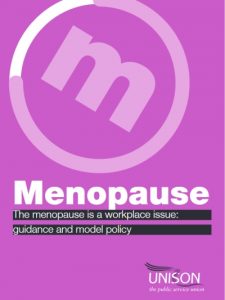 As part of World Menopause Awareness Month the branch, through the Women’s self organised group, has arranged online Menopause Training. These will be held on the following dates and times and anyone in the branch can sign up to attend.
As part of World Menopause Awareness Month the branch, through the Women’s self organised group, has arranged online Menopause Training. These will be held on the following dates and times and anyone in the branch can sign up to attend.
Wednesday 3 November – 6.00pm to 8.00pm
Monday 22 November – 9.30am to 11.30am
If you would like to sign up for either of these training dates please complete the form HERE. Places will be issued on a first come, first served basis.
Kim McIntosh, branch women’s officer said; “Even if you can’t make these dates it would good to good to know that you are interested so please let me know.
“If we have a positive response to the training we will look at arranging additional dates.”
If you have any questions you can contact Kim at auequalities@gmail.com.
Menopause awareness month
Since 2009 the International Menopause Society (IMS), in collaboration with the World Health Organisation (WHO), has designated October as World Menopause Awareness Month, with 18 October celebrated as World Menopause Day. The purpose of the day is to raise awareness of the menopause and the support options available for improving health and wellbeing.
Each year a theme is selected, the theme chosen by the IMS for World Menopause Day 2021 is Bone Health. What do we mean by ‘bone health’? Bone is living tissue with its own blood and nerve supply. The core of bone is strong enough to resist fracture when falling from your body height but is light enough to move easily. A healthy skeletal structure keeps your body intact. Bone renews itself constantly. Cells in your body remove the old bone and replace it with new bone. In healthy bone, before menopause, the production of new bone happens more than the removal of old bone. The opposite happens after menopause when ovaries stop the production of the hormone oestrogen. This leads to increased removal of bone which decreases bone strength. Other age-related changes also impact bone health. People are living longer and therefore poor bone heath is increasing. This can have an impact on day-to-day functioning, quality of life, ability to live independently and life expectancy. This also places a burden on health care systems. Diet, exercise and reducing risk of falling can help maintain healthy bones.
The International Menopause Society have interviews, videos and podcasts which may be of interest to you at: https://www.imsociety.org/for[
